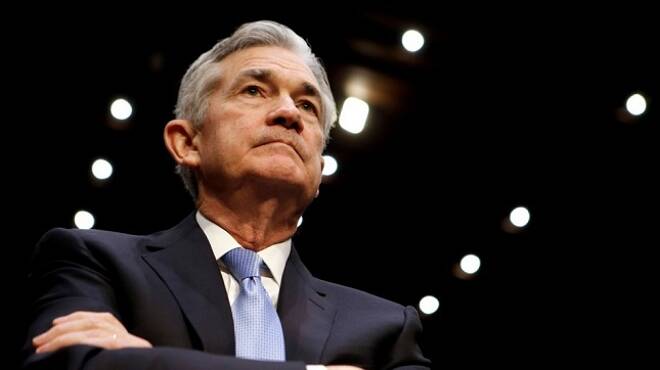Advertisement
Advertisement
This Week’s Fed Meeting: Pressure on Powell to Sound Dovish, but Not Too Dovish
By:
Ahead of the meeting, investors are expressing concerns about the U.S. economy and whether the Fed would hike further after December. As recent as September, the Fed came out as a little too optimistic about the economy next year. At this meeting, they may come down a little on their assessment of future economic growth. Investors aren’t expecting anything new from the Bank of Japan (BOJ). Look for policymakers to leave its benchmark rate unchanged at -0.1%. Japan is also scheduled to release its latest inflation data. The Bank of England (BOE) is expected to keep interest rates unchanged at Thursday’s meeting. Policymakers are holding back on raising rates at this meeting because of recent mixed economic data and fears over Brexit.
This week marks a pivotal period for U.S. Federal Reserve Policy. While the Fed is widely expected to raise it benchmark interest rates Wednesday by 25 basis points, traders are more likely to react to the comments of Fed Chairman Jerome Powell. The Bank of Japan is also expected to make an interest rate decision. It should leave its key short-term rate unchanged. The Bank of England is also expected to keep rates on hold.
Economic data releases will also be at the forefront with Australia set to release its latest data on the Employment Change and the Unemployment Rate. New Zealand Dollar traders will get the opportunity to react to the latest data on quarterly GDP. The week ends with investors paying close attention to U.S. Core Durable Goods Orders and Final GDP for the quarter.
U.S. Federal Reserve
Look for a 25 basis point rate hike from the Fed on Wednesday. As of Friday’s close, the futures market implied traders saw an 82 percent chance the U.S. central bank would increase key short-term rates by a quarter point to 2.25-2.50 percent at its policy meeting on December18-19, up from 79 percent on Thursday, according to CME Group’s FedWatch program.
Ahead of the meeting, investors are expressing concerns about the U.S. economy and whether the Fed would hike further after December. As recent as September, the Fed came out as a little too optimistic about the economy next year. At this meeting, they may come down a little on their assessment of future economic growth.
At its December meeting, the Federal Open Market Committee is expected to tweak its economic forecast. It may also express some concerns over global growth. Fed Chairman Powell is also expected to hold a post-announcement press conference. At the briefing, he could discuss Fed officials’ concerns about the impact of trade wars and possibly financial conditions.
More importantly, the pressure is on Powell to sound dovish, but not too dovish as to raise fears about the strength of the economy. Stock market investors are hoping Powell sounds dovish enough to ease market fears that it is moving too aggressively. If he is able to pull this off then it may spark a rally in the equity markets.
Bank of Japan
Investors aren’t expecting anything new from the Bank of Japan (BOJ). Look for policymakers to leave its benchmark rate unchanged at -0.1%. Japan is also scheduled to release its latest inflation data. The year-on-year rate of inflation of 1.4% hit in November is expected to remain unchanged. This will confirm the central bank’s assessment that despite years of monetary easing, it has not been able to reach its price stability target at 2%.
Bank of England
The Bank of England (BOE) is expected to keep interest rates unchanged at Thursday’s meeting. Policymakers are holding back on raising rates at this meeting because of recent mixed economic data and fears over Brexit.
Recent data shows the UK economy may be losing momentum so a rate hike at this time may curtail economic growth. However, there is a bright spot, strong wage figures suggest inflationary pressures are building in a labor market devoid of spare capacity. The major concern for BOE policymakers is how to handle the Brexit mess. Central bankers may have to sit on their hands until the government can strike a deal with the European Union, or leave the EU without a deal in March.
About the Author
James Hyerczykauthor
James Hyerczyk is a U.S. based seasoned technical analyst and educator with over 40 years of experience in market analysis and trading, specializing in chart patterns and price movement. He is the author of two books on technical analysis and has a background in both futures and stock markets.
Advertisement
